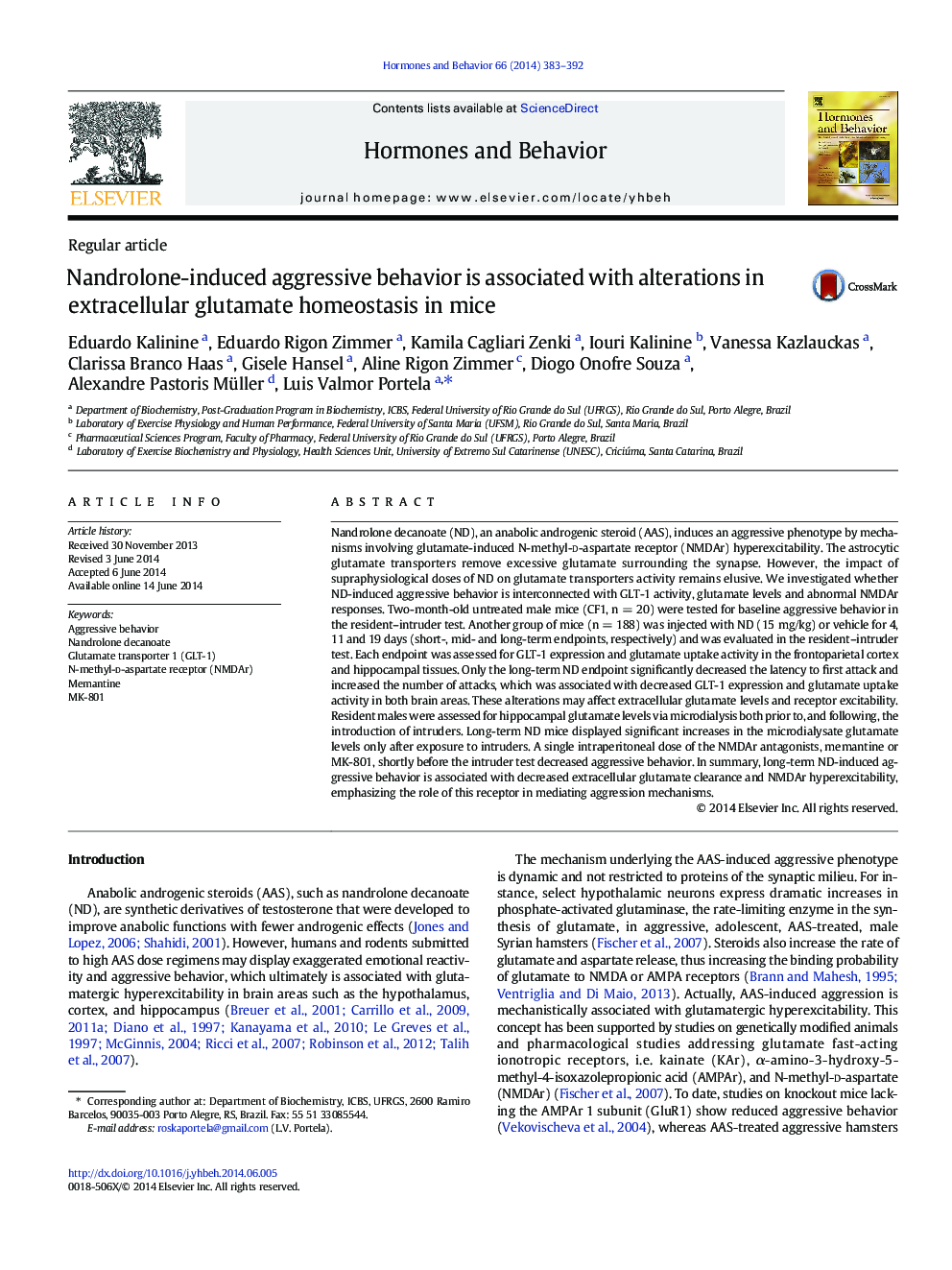| کد مقاله | کد نشریه | سال انتشار | مقاله انگلیسی | نسخه تمام متن |
|---|---|---|---|---|
| 10301065 | 540645 | 2014 | 10 صفحه PDF | دانلود رایگان |
عنوان انگلیسی مقاله ISI
Nandrolone-induced aggressive behavior is associated with alterations in extracellular glutamate homeostasis in mice
ترجمه فارسی عنوان
رفتار تهاجمی ناشی از ناندرولون با تغییرات در هوموستاز گلوتامات خارج سلولی در موشها همراه است
دانلود مقاله + سفارش ترجمه
دانلود مقاله ISI انگلیسی
رایگان برای ایرانیان
کلمات کلیدی
موضوعات مرتبط
علوم زیستی و بیوفناوری
بیوشیمی، ژنتیک و زیست شناسی مولکولی
علوم غدد
چکیده انگلیسی
Nandrolone decanoate (ND), an anabolic androgenic steroid (AAS), induces an aggressive phenotype by mechanisms involving glutamate-induced N-methyl-d-aspartate receptor (NMDAr) hyperexcitability. The astrocytic glutamate transporters remove excessive glutamate surrounding the synapse. However, the impact of supraphysiological doses of ND on glutamate transporters activity remains elusive. We investigated whether ND-induced aggressive behavior is interconnected with GLT-1 activity, glutamate levels and abnormal NMDAr responses. Two-month-old untreated male mice (CF1, n = 20) were tested for baseline aggressive behavior in the resident-intruder test. Another group of mice (n = 188) was injected with ND (15 mg/kg) or vehicle for 4, 11 and 19 days (short-, mid- and long-term endpoints, respectively) and was evaluated in the resident-intruder test. Each endpoint was assessed for GLT-1 expression and glutamate uptake activity in the frontoparietal cortex and hippocampal tissues. Only the long-term ND endpoint significantly decreased the latency to first attack and increased the number of attacks, which was associated with decreased GLT-1 expression and glutamate uptake activity in both brain areas. These alterations may affect extracellular glutamate levels and receptor excitability. Resident males were assessed for hippocampal glutamate levels via microdialysis both prior to, and following, the introduction of intruders. Long-term ND mice displayed significant increases in the microdialysate glutamate levels only after exposure to intruders. A single intraperitoneal dose of the NMDAr antagonists, memantine or MK-801, shortly before the intruder test decreased aggressive behavior. In summary, long-term ND-induced aggressive behavior is associated with decreased extracellular glutamate clearance and NMDAr hyperexcitability, emphasizing the role of this receptor in mediating aggression mechanisms.
ناشر
Database: Elsevier - ScienceDirect (ساینس دایرکت)
Journal: Hormones and Behavior - Volume 66, Issue 2, July 2014, Pages 383-392
Journal: Hormones and Behavior - Volume 66, Issue 2, July 2014, Pages 383-392
نویسندگان
Eduardo Kalinine, Eduardo Rigon Zimmer, Kamila Cagliari Zenki, Iouri Kalinine, Vanessa Kazlauckas, Clarissa Branco Haas, Gisele Hansel, Aline Rigon Zimmer, Diogo Onofre Souza, Alexandre Pastoris Müller, Luis Valmor Portela,
